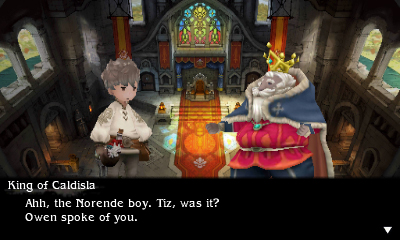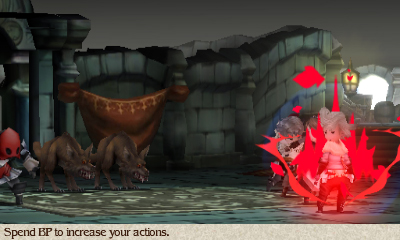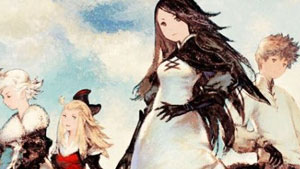It’s a curious feeling when an experience is simultaneously familiar, yet brand-new at the same time. In truth, the JRPG is a subgenre that is so stifling in the execution of both story and gameplay that for a title to deviate from the well-worn formula even slightly catapults it into one of numerous additional subgenres or strange niches. The player’s progression from Town to Field Map to random battle allows little room for creative manoeuvring, much in line with a story arc that almost requires teenage melodrama, love, revenge and tragedy. Pick a Japanese roleplaying game from any point in the last decade and the tropes are intact. So to release yet another title into the menagerie of stylised youths with improbable swords should barely register attention. The fact that this particular contribution is from SquareEnix doesn’t evoke the same excitement as it used to. While the last set of Final Fantasy games have been competent, the lustre and character of the series has long since dulled.
So how do you explain Bravely Default? How can the same frequently trodden path still keep you entranced until the small hours of the morning? SquareEnix has managed a rare feat with this title. They have rebooted a series without making a reboot. They have somehow discarded the past 20 years of Final Fantasy and Dragon Quest history while simultaneously reusing all the features that made those games great. They have done so in a way which is sincere in its homage, yet can stand on its own two feet without the history of any pedigree propping it up. It’s a beloved author writing under a pseudonym. This game will wink at you. It will know that you are aware of everything that it’s done up to this point. But without a hint of irony, it will sit you down and tell you a story about a boy that has lost his village and a girl that will save the world.
Let’s return to earth and begin with a concession. I am a JRPG fan. Not the biggest one in the world, and it’s more often that I will leave a sprawling adventure such as this unfinished. However, the kitsch storylines and turn based battle systems always seem to hit a sweet spot with me. Bravely Default is a classic example of the genre. If you’ve never liked this type of game, then it will do nothing to convince you otherwise. It starts with an overwrought plea for assistance and a suitably cataclysmic event that accompanies it. From there on it’s a déjà vu inducing story of a world in imbalance, the magic crystals (because it is always magic crystals) that must be restored, and the personal stories of the four individuals that are brought together to throw back the encroaching evil. Right away, however, the formula is mixed up. The player is given access to a prophetic journal that will outline almost the entire story, albeit in a vague and obfuscated way. Rather than act as spoilers, it’s enticing to read and revisit as the plot unfolds. You’ll find yourself looking on some pages with a new understanding as the events predicted actually take place and meanings become clear. The plot is definitely linear and somewhat predictable in places, however. Prepare to fetch the McGuffin from location A and bringing it back to location B to obtain the key to location C and so on. There are optional side quests that offer welcome diversions, but these blur the meaning of the word “optional” as they unlock some of the more interesting job choices. I cannot fathom a reason you’d want to pass them up.

Yes, job choices. Familiar hallmarks are present here as well, with a character development system that will feel at home to Dragon Quest or Final Fantasy Tactics fans. Characters level up with exp, Jobs level up with JP. Both are gained at the end of each battle. Characters can change jobs and take their favourite abilities from each job with them. It’s a simple system but one that conceals a massive amount of depth, especially for the powergamer who doesn’t mind a few afternoons of farming in exchange for cherrypicking the best abilities from each class. Don’t let this assertion fool you into thinking that the grind is required though. Thankfully the game is balanced and challenging, yet surmountable, every step of the way. Not once did I find myself circling in the desert for hours because I had hit a wall in terms of boss difficulty, although there were a few near misses that required a quick retreat to restock on supplies. The battle system itself is again familiar, but with a twist in the form of the titular Brave/Default system. Defending (or “defaulting”) stocks up points that can be cashed in for additional turns in the future, as well as reducing damage taken. Up to four turns can be stocked up allowing you to defend against an anticipated attack and strike back twice in the next round. Easier fights can be a breeze with this system, allowing you to spend these points into the negative, recovering them with turns of forced inaction. If you can wipe out the enemy with a flurry of activity on the first turn, you’ll avoid the down side of standing still and taking a beating. It’s a risk/reward system that favours cautious and strategic play, especially when fighting a tough enemy over several turns. Anticipating the manner in which each enemy attacks means you’ll be doing more than just hammering the attack button and healing when required.
Visually, the game is sumptuous, both in cut-scenes and in gameplay. The entire game has a distinctive visual style that would look at home illustrating the pages of Arabian Nights; smooth and sumptuous, with a distinctive use of colour and animation, the enemy models are, in places, fantastically realised. The Panther being especially eye catching in the earlier stages. Being on the 3DS, there obviously has been considerable effort enhance the game’s set pieces with added depth. Although 3D visuals are usually taken with a pinch of salt, this is the finest looking game I’ve played so far in this regard. The hand painted town locations are extremely well constructed with an extraordinary attention to detail. The dungeon segments are bland by comparison, but thankfully each one is still visually distinct and they don’t outstay their welcome.

The only area that Bravely Default does fall short on is the multi-user aspects. Unsurprisingly, there is no direct multiplayer available. Instead, Bravely Default uses StreetPass and Nintendo Friends List to fuel a few mechanics that enrich gameplay. The Farmville style village management minigame has you collecting StreetPass hits to add villagers to aid in rebuilding a ruined settlement. Each building takes a chunk of real time to complete. The more villagers you collect and assign to tasks, the less time it takes to complete a project. Building more structures adds to in-game item shops or unlocks components for special moves. It’s a cute idea, but rather shallow in execution. No real effort is taken to endear you to the village that you’re supposed to be saving. The curious thing about all the networking features is that they don’t seem to be balanced by level. It is possible to use special moves that have been broadcast by your friends, for example. It’s possible to obtain a move that does damage way beyond whatever you’re capable of at the time, allowing you to 1-hit challenging boss monsters on the first turn. It’s not mandatory, of course, and can only be used once per move, but the temptation is still there. Also, it’s possible to send invaders to other villages, requiring that they be fought and driven off in exchange for a reward. A nice idea, but when you find your village infected with a rash of level 99 beasts with no hope of beating them in a fair fight, it rather loses its novelty.
There are shortcomings, of course, but Bravely Default is a shining gem of a title that should take its place alongside Fire Emblem as an essential purchase for all but the staunchest opponents of the JRPG. It is familiar yet fresh, well-presented and engaging while managing to bypass the standard genre tropes that make playing feel like work. The areas that it misses the mark do nothing to detract from the core experience and the characters are distinct enough that they will stick in your head long after you’re done playing. It is not a brand new journey in storytelling, rather a long awaited homecoming.

Platform
Developer
Square Enix
Publisher
Nintendo
Release Date EU
06 December 2013
Release Date US
07 February 2014
Release Date JP
05 December 2013